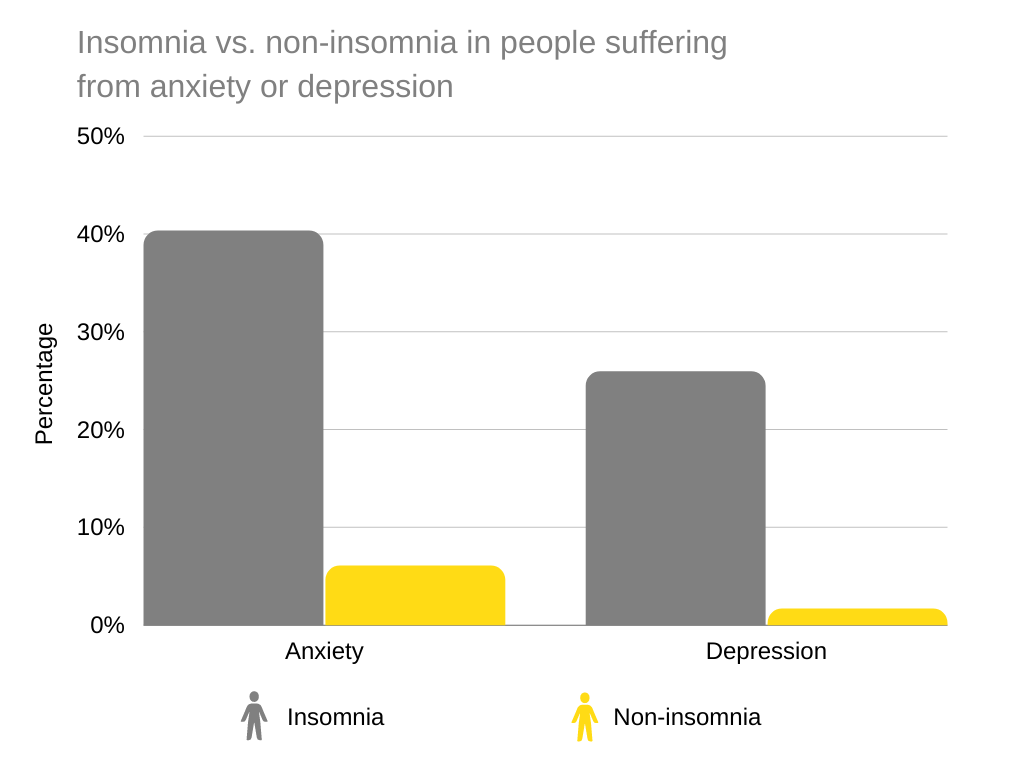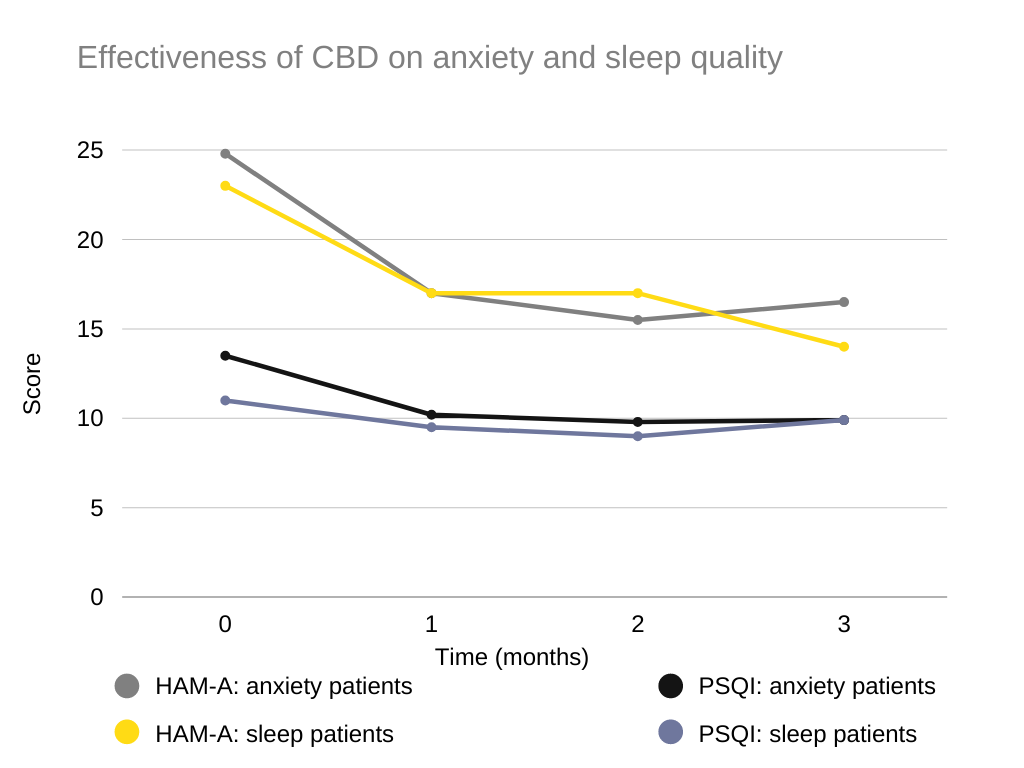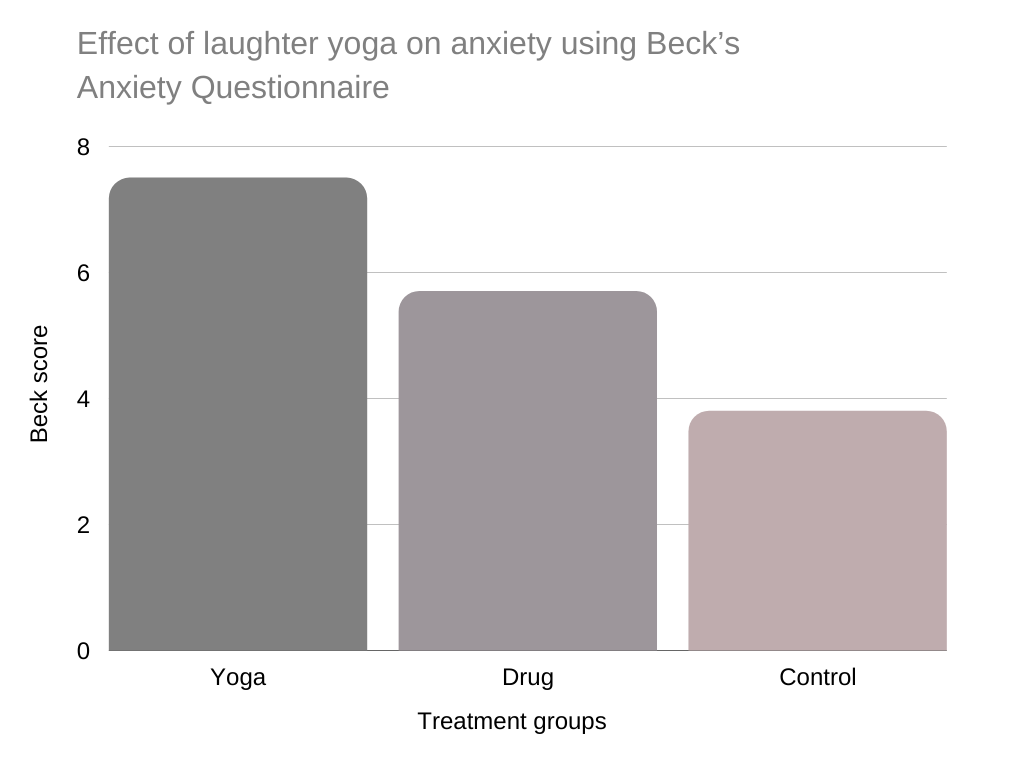Farrinstitute is reader-supported. We may receive commissions on purchases made through links on our site.
Dealing with anxiety at night, which often leads to lack of sleep, can be a real challenge. It’s like trying to calm a stormy sea inside your mind, preventing you from finding the peaceful shores of sleep.
If you find yourself tossing and turning, consumed by worries or fears, you’re not alone.
Fortunately, there are proven methods on how to calm anxiety at night and ensure a more restful sleep. These might include practicing relaxation techniques, establishing a calming bedtime routine, or trying sleep aids like FOCL Night.
Keep reading to learn more about sleep anxiety and explore your options for relief.
Sleep anxiety is characterized by fear or worry about falling asleep or staying asleep, which may lead to insomnia and other sleep problems. Research shows that chronic insomnia affects 10 in 100 adults in the U.S., making it a major public health concern [1]. The nation’s aging population is particularly affected, with over 50% of older adults suffering from sleep deprivation [2].
As the most common mental health problem, anxiety is a major cause, but why do we let it steal our precious sleep from us? And what can we do to stop it?
Here’s a brief overview of sleep anxiety, its symptoms, and how to manage it.
>>Check the best prices for FOCL Night
The inability to go to sleep at night is one of the symptoms of sleep anxiety. It could be caused by too much of the stress hormone Cortisol in your brain. Other common anxiety symptoms are:
To sleep, we need to attain a level of physical relaxation. That’s why, with anxious thoughts, a busy mind, and tense muscles, it becomes much more difficult to fall asleep and stay asleep.
Also, there is nothing to distract you from niggling negative thoughts at night. Unfortunately, this can put you into a vicious cycle. The more you focus on sleeping or not sleeping, the more you feel anxious about it, causing a spiral of many restless nights that you do not feel in control of.

People suffering from anxiety are more likely to experience insomnia than people with general depression
Anxiety attacks at night, also known as nocturnal panic attacks, seem to come on spontaneously and are characterized by the following symptoms:
If you are experiencing a nocturnal panic attack, try to remain calm, breathe, and reassure yourself it will pass over soon: Most nocturnal panic attacks will be over within a few minutes.
Here are quick strategies to tackle nighttime anxiety:
Creating a healthy routine may be your first step to a better night’s sleep. Besides setting a bedtime and sticking to it, think about good sleep hygiene. This may also include a daily plan with regular exercise and a fixed wake-up time.
Your natural circadian rhythms need nurturing, which means being awake and active during daylight hours and then staying asleep at night.
>>Check the best prices for FOCL Night
Try taking your mind off the target of sleep by focusing on the art of relaxation. Here are a few ideas to make this happen:
Mindfulness meditation is an ancient technique that has gained popularity in the West. It can offset some of the psychological damage caused by our stressful ‘auto-pilot’ lifestyles.
It has been proven to increase activity in centers of the brain that are conducive to memory and learning, consequently creating healthier minds. Sleep research has shown that mindfulness meditation training drastically improves sleep health for its participants [3].
Healthy sleep habits, also described as sleep hygiene, are a way for you to try and get your sleep patterns sorted out. Have a look at these simple tips on how to achieve quality sleep:
A consistent, calming nighttime routine can be one of the first steps to getting a good night’s rest. Rituals such as a candle-lit bath, putting on comfortable pajamas, and brushing your teeth at the same time each night can reinforce in your mind that it’s bedtime.
Incorporating at least half an hour into your sleep schedule to wind down by listening to relaxing music, reading, or practicing relaxation can ease anxiety and prepare you to fall asleep. Avoid electronics or watching any screens during this time, as they may overstimulate you.
>>Check the best prices for FOCL Night
When you’ve figured out what rituals work for you, it might be worth trying some products that help you relax and indulge in great sleep.
Weighted blankets apply pressure on your body, making you feel grounded and safe. They have favorable results in reducing the anxiety of people with mental health problems [4].
Cannabidiol (CBD) is an extract from the cannabis sativa plant that is increasingly being used as therapy for a range of mental health problems, including generalized anxiety disorder [5].
Some over-the-counter CBD supplements may help promote relaxation and alleviate symptoms of anxiety, making it easier to fall asleep and stay asleep throughout the night.

CBD has been shown to improve both sleep and anxiety in patients over three months
Lavender and camomile are the ‘go-to’ essential oils for aromatherapists to reduce anxiety, bring about relaxation, and improve sleep quality. There is an array of other scents with soothing effects said to reduce depression, such as ylang-ylang and certain types of sage.
>>Check the best prices for FOCL Night
Sound machines project sounds of nature into your room, giving your mind a distraction to help you drift off to sleep. Sounds from ocean noises, birds singing, and crackling wood fire can help give your brain the necessary comfort for improving sleep.
When natural remedies are just not enough, it is worth digging deeper and getting advice, diagnosis, or treatment options from medical associations. Sleep deprivation is taken seriously by both health and mental health professionals, and they can provide medical advice on how to tackle sleep anxiety.
People with anxiety disorders may face a higher risk of mental health problems, partly because anxiety often goes hand in hand with depression and can lead to sleep deprivation.
Medical conditions can go hand in hand with poor sleep. Sleep apnea, for example, is a sleep disorder where breathing starts and stops during sleep, sometimes waking people up and causing sleep disturbance.
You may not be aware of your sleep apnea, but common symptoms are very loud snoring and feeling tired even when you thought you slept well.
Some health problems like stomach ulcers and irritable bowel syndrome (IBS) are caused by anxiety disorders. This happens especially when stress hormones have damaged the immune system and stomach lining.
>>Check the best prices for FOCL Night
Cognitive behavioral therapy is a type of psychotherapy that aims to train patients to create more positive thought processes. This can teach people to think differently about their worries and is proven to be a reliable treatment for secondary symptoms of anxiety, such as having trouble sleeping [6].
Benzodiazepines are a group of tranquilizers that are commonly used for immediate relief of anxiety. They might be useful if you have a panic disorder or serious anxiety disorder.
The most well-known is called Xanax. It is usually prescribed for temporary relief only, as it can have unwanted side effects and cause dependency when frequently used.
Besides CBD, chamomile, and lavender, a well-balanced diet and a healthy lifestyle are also highly acclaimed natural treatments for depression, anxiety, and sleep problems.
Kava, an herbal remedy, has also been shown to cure symptoms causing sleep problems, but findings on its effectiveness are mixed [7].
In a comparison study between the effects of anti-anxiety meds and laughter yoga, the results showed that yoga can positively impact participants’ moods more than medication [8].

Laughter yoga was shown to make the biggest difference in Beck’s score compared to the drug and control groups
Natural sleeping pills like FOCL Night can also be a great option for some people. These supplements often contain ingredients like melatonin, valerian root, or chamomile, known for their relaxing and sleep-promoting properties. Think of them as natural tranquilizers for your mind.
They can help you unwind, drift off to sleep easier, and potentially improve the overall quality of your sleep.
Below, we explore common questions people ask on how to calm anxiety at night or reduce sleep anxiety in general.
There are a few reasons why this might be the case. During the day, you’re busy and distracted, but at night, everything quiets down, and your worries can take center stage. Plus, some folks with anxiety disorders might find that their body’s circadian rhythm makes it tougher to wind down.
Don’t worry; you’re not stuck counting sheep forever. There are ways to calm those nighttime jitters. Relaxation techniques like deep breathing or meditation can be a big help. Creating a calming bedtime routine signals your body that it’s time to wind down. Also, avoiding caffeine and alcohol before bed can make a difference since those can worsen anxiety.
Catching some sleep when dealing with high anxiety can feel impossible, but there are tricks. Focus on creating a sleep-friendly environment – cool temperature, dark room, comfy bed. Try relaxation techniques before bed, like reading or taking a warm bath. If your worries are racing, jot them down on paper to get them out of your head.
Panic attacks at night can be scary, but there are ways to cope. Focus on calming your breathing – slow, deep breaths can help signal your body to relax. Practice mindfulness techniques to ground yourself in the present moment. You should try to identify any triggers that might be setting off your panic attacks at night and address them.
>>Check the best prices for FOCL Night
Sleep anxiety is serious, and if you have ever suffered from it, you know why. Its side effects can stop you from functioning, affecting all areas of your life: work, relationships, leisure time, and general mental well-being.
If you are suffering from sleep problems caused by anxiety and are looking for ways to calm anxiety at night, you are not alone. The answer to fixing it may be in a combination of sleep hygiene and other relaxation tips or therapy, which we have extensively covered in this article.
Remember that the solution to better sleep will probably not come overnight, and it may take some planning and patience. However, if your anxiety disorder is severe with panic-like symptoms, it would be wise to talk with a mental health professional.
>>Check the best prices for FOCL Night